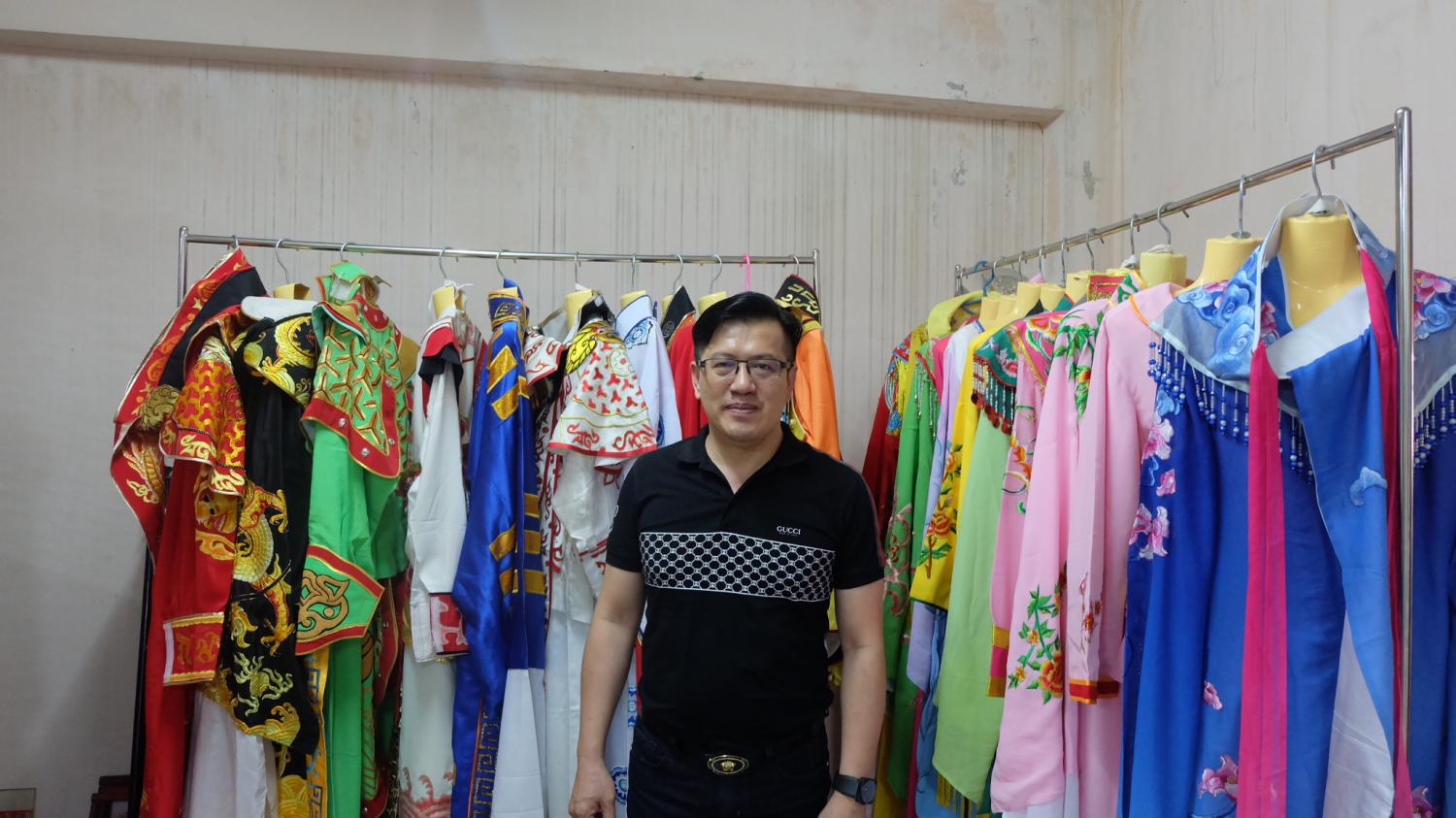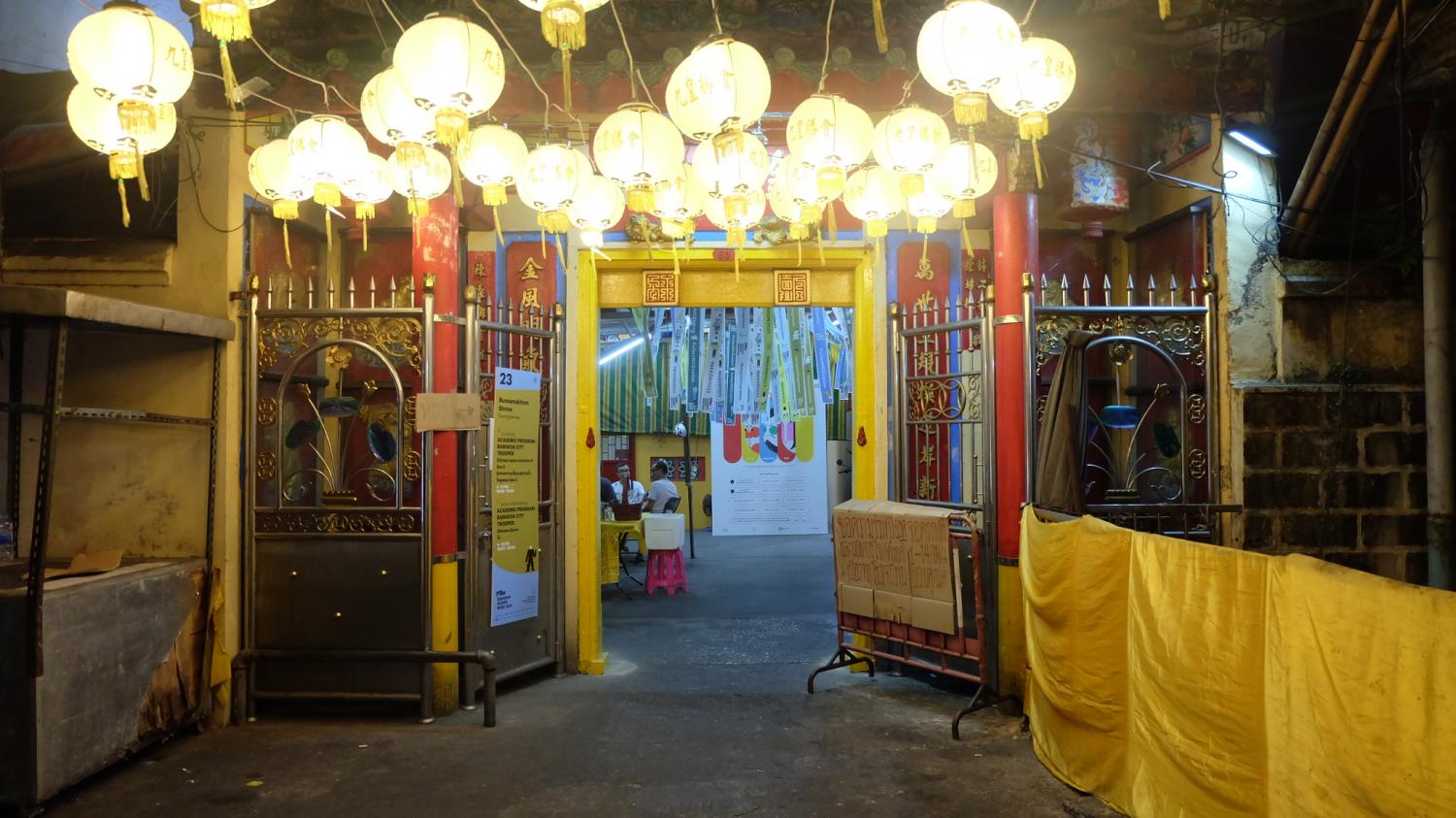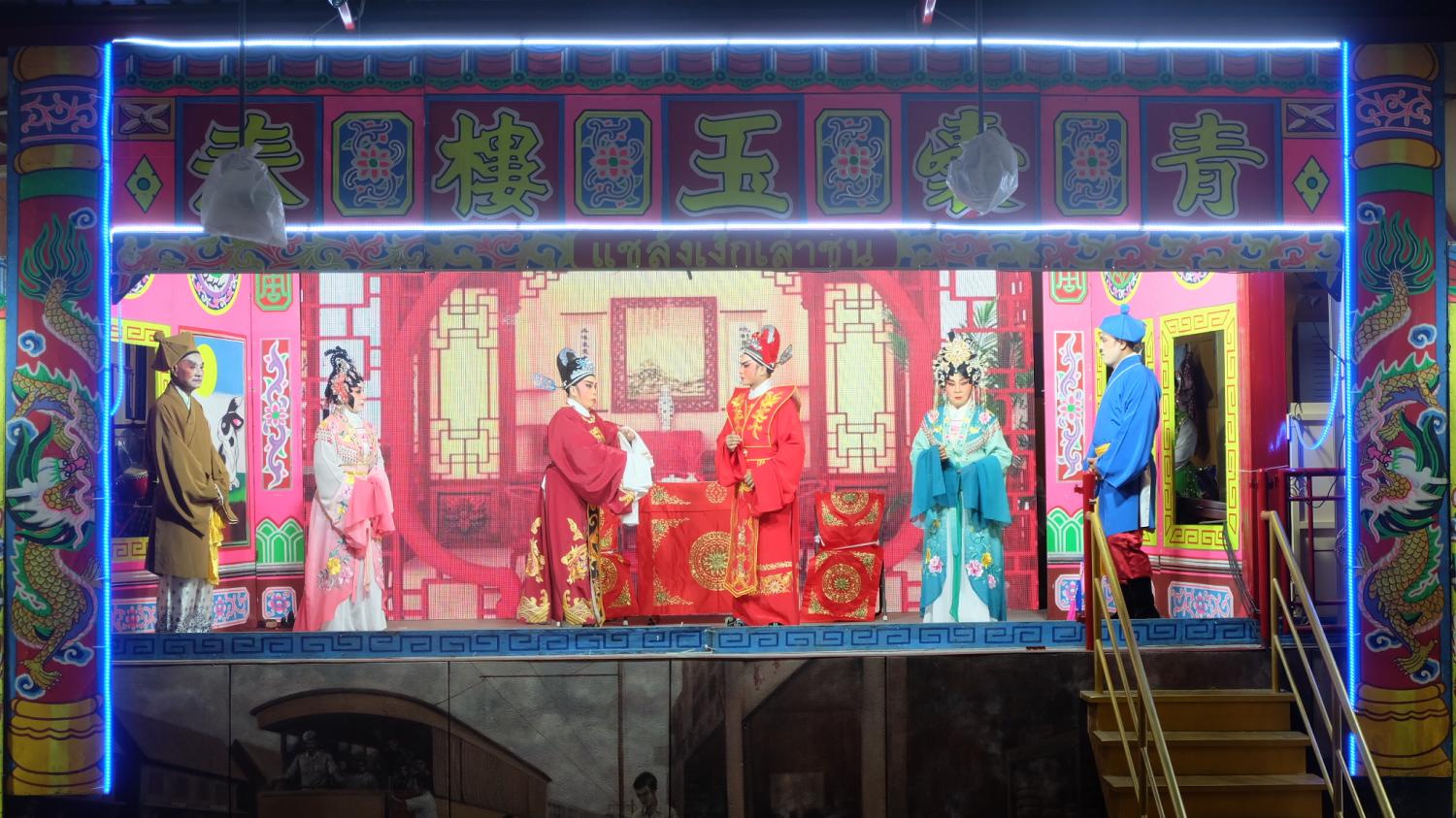"Hurry up," shouted a crew member who climbed up onto a makeshift stage. Casting sidelong glances, performers, half-clad, looked in the mirror and concentrated on applying layers of make-up. Nearby, a motley bunch of musicians and technicians double-checked their instruments. A stream of chatter from a growing audience -- without any partition between the theatre and real life -- put unintended pressure on the band.
Someone finally gave a signal.
"We are ready."
On a humid night, a curtain soon went up amid gongs and drumbeats. Dressed in garish costumes, characters sang and glided across the stage. A husband bade farewell to his wife, leaving to take an imperial examination in the capital. Soon, two wealthy men came to collect her husband's debt. Despite her pleas, they confiscated her two infants to clear outstanding debts. A family drama of separation for 20 years ended with reunion.
Delivered in Teochew dialect, the story is titled Zeg Mung Sa Zing Se (A Home Of Three Scholars). At the oldest shrine in Bangkok's Chinatown, visitors, especially the elderly, were "edutained" by tale after tale for hours during Bangkok Design Week, which wrapped up earlier this month. Dating back to the reign of King Narai, the art of Chinese opera, or ngiw in Thai, is waning in popularity due to changing cultural habits.
"It isn't making profit any more, but with my back against the wall I can't retreat," said Thirapatnon Anankawin, the 53-year-old owner of Chae Lang Ngek Lao Chun, a Chinese opera troupe that has been performing for almost a century.
"I can't stand people sneering at me. I want to make them know that despite my talented father's lack of success, I can make it for him. I must avoid losing face at all cost."
He added: "The number of troupes has dropped from over 100 to 20-something. Soon, it will be single digit."
A few days after the show, I visited his shophouse in Thung Khru district. It's an office and warehouse for costumes and stage props. Some of them are placed in chae lang (green boxes), a reminder of the heyday of this ancient art. Surprisingly, it is home to medical equipment and other goods that are providing an alternative source of income for keeping the age-old tradition alive.
Born into a family of Chinese opera performers, Thirapatnon witnessed the struggle of his parents and their troupe for survival. His Chinese father taught the ancient craft and wrote screenplays, while his Thai mother played the male lead (in those days, men and women were cast for this role).
His parents worked for a troupe in Singapore for 20 years until war broke out. Upon returning to Thailand, they worked for Chae Lang, one of five theatres in Yaowarat (it later became Chae Lang Ngek Lao Chun). In those days, the theatres were managed by mafia. When the owner mistreated his father, he felt discouraged and quit, although he had brought fame to the theatre. His parents swapped gold and a refrigerator for cash to buy a new troupe. However, the venture was not a success.

Thirapatnon Anankawin, or Uncle Teck, the 53-year-old owner of Chae Lang Ngek Lao Chun at his warehouse in Thung Khru district. (Photo: Thana Boonlert)
"Our family excelled in ngiw, but did not have a brain for money. An assistant often deceived my father into giving him pocket money to travel to sign a show contract, but ended up claiming that others had cut our troupe off. I remember that my father had my sister put a television set we were watching in pawn. He died of cancer at 55 before getting a home phone for contact with potential clients," he said.
His mother took the helm of the family's business. While prominent troupes dominated almost every region, nobody dared to perform in the South with its remoteness and reputation for being crime ridden. But his mother did perform there. The band spent nine months a year performing "like a beggar" because jobs were difficult to come by. The situation improved when his sister married an influential person in Surat Thani and he bought the troupe. It is now run by his sister.
With his passion for music, Thirapatnon learned to play the cymbal at an early age. He worked for his sister's troupe to collect enough money to study music in China.
"It turned me into a winged tiger," he said.
But once back in Thailand he ended up working for a local businessman in Chon Buri for seven years, though a benefit was he gained valuable managerial skills. At 28, he bought Chae Lang Ngek Lao Chun, where his father once worked, from the second owner.
"At first, I planned to run it for three years, but the gods may have locked me into the job," he said. "At that time, Chinese opera saw a steady decline. Kind of an audience-less art. It was said that only deities would watch the performance. Very discouraging. Besides, an agent in Malaysia banned our troupe for 169 days because it was perceived to be a mafia, costing me over a million baht in damages."
Yet, he soldiered on. While preserving tradition, he decided to make the show more entertaining. He sent his grandchild to study the art of face changing in China. An overwhelming success encouraged the troupe to experiment with thousand-hand Guanyin and gangfu dance. His band received considerable publicity from almost a hundred television programmes and competitions. It was fully booked.

Performers apply make-up backstage. (Photo: Thana Boonlert)
"If my father had been alive, I would have told him that I made it. Despite his unrivalled talent, he was unable to show it," he said of the band's success over a decade ago.
The rebirth of entertaining ngiw led to the establishment of the Chinese Opera Association, where Thirapatnon wears the hat of vice-president. His troupe performed at the royal crematorium for King Bhumibol Adulyadej. It also pioneered a Chinese-language version of the epic Ramakien for the first time at Un Ai Rak Khlai Khwam Nao Winter Festival (Love And Warmth At Winter's End).
Currently, most troupes perform in Chinese but provide surtitles or brief synopses in Thai, he said. Sometimes they make local episodes, depending on resources. At Bangkok Design Week, his troupe once staged a Thai version of Judge Pao. The choice of local adaptation comes down to whether crew members can perform.
However, Covid-19 has dealt a heavy blow to the performing arts. Faced with severe economic impacts, clients have cancelled or downsized entertainment productions. Despite surviving the pandemic, the band has been contending with a lack of new blood. Some 80 years ago, poverty-stricken families would indenture their children to troupes, which developed into full-time employment, although the job's stringent training requirements discouraged some students.
"In those days, trainees practiced shoulder to shoulder. When one of them stood shakily or sang out of tune, teachers punished everybody to make sure they would not repeat a mistake. Each day, rehearsal took eight hours, followed by a performance of up to six hours. All of them had a promising future, but now they don't want their children to follow this path. None of my four children will take it up," he said.

Chae Lang Ngek Lao Chun performed at Bunsamakhom Shrine during Bangkok Design Week earlier this month. (Photo: Thana Boonlert)
In light of the succession crisis, his troupe hires skilful Chinese actresses, who make up only 5% of the troupe of around 40 members. There are also more than 200 freelancers. The Chinese actresses perform and train newcomers, some of whom are university graduates with a passion for Chinese opera.
"Why is it not popular any more?" I asked.
"Clients," he said. "In the past, they were eager to fight for good ngiw, no matter how much they were charged for it. But now, they bargain for cheaper prices or choose some troupes that undersell without knowing they do a sloppy job. That is why troupe owners don't want their children to carry the tradition forward."
Yet, it is belief in Chinese-Thai customs that gives him a lifeline. His troupe regularly performs at shrines under annual contract. One books his troupe for 10 years in advance. Basically, shrines earn substantial income from selling items at auction to worshippers. For example, a plate of auspicious oranges can be priced up to 1 million baht. In the process, they hire troupes to perform to attract devotees.
"We survive because the gods help us," said Thirapatnon.

Zeg Mung Sa Zing Se is a family drama of separation and reunion. (Photo: Thana Boonlert)

